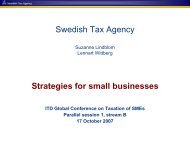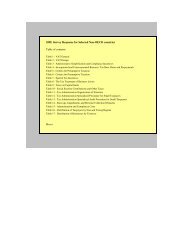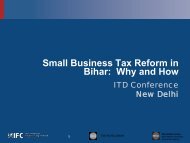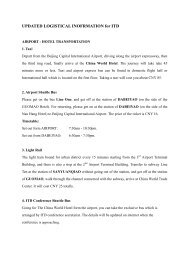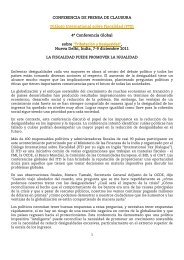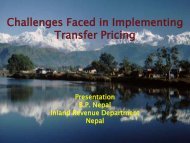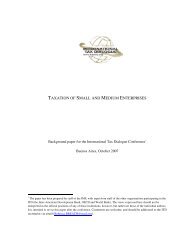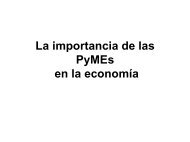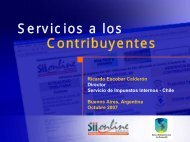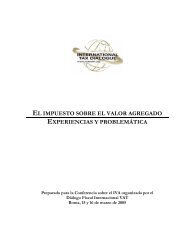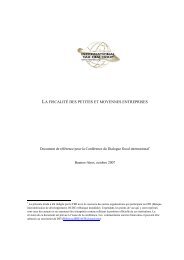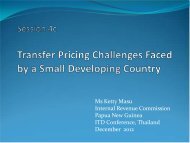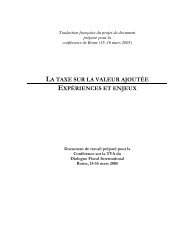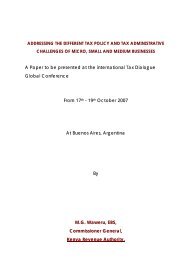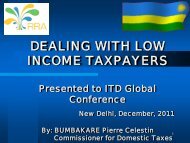Arcotia Hatsidimitris - International Tax Dialogue
Arcotia Hatsidimitris - International Tax Dialogue
Arcotia Hatsidimitris - International Tax Dialogue
You also want an ePaper? Increase the reach of your titles
YUMPU automatically turns print PDFs into web optimized ePapers that Google loves.
64 – 7. RESOURCES, SKILLS AND USE OF SPECIALISTS<br />
• used the UK’s Government Actuary Department because of their expertise on pricing returns<br />
on capital.<br />
How to engage with external specialists<br />
The decision about whether to retain external specialists to provide bespoke advice on particular<br />
issues or to recruit specialists from the private sector as employees of a tax administration can be a<br />
difficult one. Where experts are independent of the administration, they are able to provide an<br />
unbiased view about how transactions differ from those that would have taken place at arm’s length.<br />
They command authority and have either first-hand commercial experience, or experience of advising<br />
in commercial assignments, to help formulate rigorous arguments, supported by reference to academic<br />
studies and theories. Many have considerable experience as expert witnesses and are consequently<br />
skilled in framing forensic arguments clearly and precisely, and in bringing resolution to disputes. It<br />
should also be noted that external experts are generally dependent on their success in past assignments<br />
in order to attract new work and this can be a powerful incentive for them to deliver outstanding<br />
performance.<br />
What external specialists can deliver<br />
Importantly experts can help focus interventions on the key risks and issues and assist in framing<br />
information requests. For example, they are often able to advise, from personal experience, precisely<br />
what documentation should be available to bring out key facts. This is invaluable in helping to focus<br />
in on those key issues and scope out areas of dispute to provide added credibility to the<br />
administration’s engagement on an issue. The experience in South Africa of using external experts to<br />
support the preparation of transfer pricing cases and give evidence in court has been very successful.<br />
However, SARS has also found that industry experts can sometimes be reluctant to help a tax<br />
administration, whether in the context of conducting audits and enquiries, or in litigation, if those<br />
experts have an expectation of other pricing work, perhaps elsewhere in their area of expertise.<br />
Selecting the specialist<br />
In selecting experts it is important to find individuals who can explain technical issues in ordinary<br />
language and who, where relevant, are articulate and persuasive in court. Both HMRC and SARS<br />
have also found that in transfer pricing cases commercial litigators are often more effective than tax<br />
litigators. Transfer pricing cases are very fact dependant and commercial litigators are more<br />
experienced in drawing out factual evidence in cross-examination. In Denmark, SKAT is now<br />
permitted to make more and more use of the private tax legal advisors that acts as counsel of the State.<br />
It is SKAT’s experience that the additional costs that may be incurred are balanced by the help<br />
received in deciding matters of principal and preparing transfer pricing cases for court.<br />
Knowledge and skills transfer from specialists<br />
Ensuring transfer of knowledge and skills from external experts to tax administration staff<br />
working transfer pricing cases can be more challenging as these experts often tend to focus principally<br />
on ensuring the success of their assignment. Recruiting specialists and/or experts as employees is<br />
generally a more successful way of delivering transfer of knowledge and skills and this is best done by<br />
enabling them to play a part in the work of several teams at the same time. Whilst in house experts and<br />
specialists can be successful as expert witnesses in litigation or in hearings connected with processes<br />
for alternative dispute resolution, over time they become increasingly detached from specific industry<br />
developments and knowledge and therefore lose some expertise. That can mean they become less able<br />
to make a meaningful contribution on individual cases.<br />
DEALING EFFECTIVELY WITH THE CHALLENGES OF TRANSFER PRICING © OECD 2012



